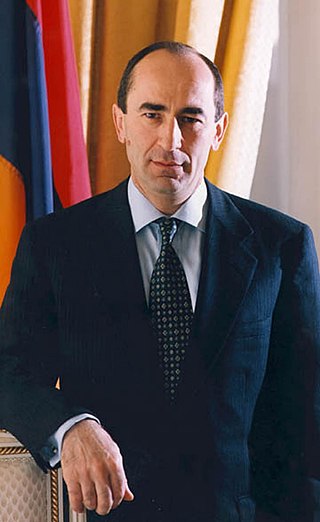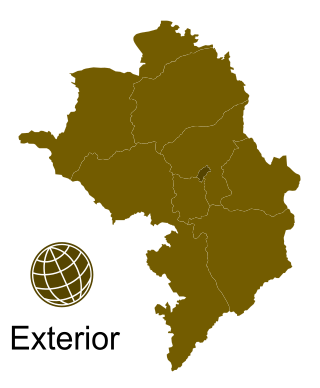
Robert Sedraki Kocharyan is an Armenian politician. He served as the President of the Nagorno-Karabakh Republic from 1994 to 1997 and Prime Minister of Nagorno-Karabakh from 1992 to 1994. He served as the second President of Armenia between 1998 and 2008 and as Prime Minister of Armenia from 1997 to 1998.

Artsakh, officially the Republic of Artsakh or the Republic of Nagorno-Karabakh, was a breakaway state in the South Caucasus whose territory was internationally recognised as part of Azerbaijan. Between 1991 and 2023, Artsakh controlled parts of the former Nagorno-Karabakh Autonomous Oblast of the Azerbaijani Soviet Socialist Republic, including its capital Stepanakert. It had been an enclave within Azerbaijan from the 2020 Nagorno-Karabakh war until the 2023 Azerbaijani offensive, when the Azerbaijani military took control over the remaining territory controlled by Artsakh. Its only overland access route to Armenia after the 2020 war was via the five kilometres (3.1 mi)–wide Lachin corridor, which was placed under the supervision of Russian peacekeeping forces.

Politics of Artsakh took place within the constraints of a written constitution, approved by a popular vote, that recognises three branches of government: executive, legislative and judicial. The executive branch of government was exercised within a framework of a presidential representative democratic republic, whereby the President of Artsakh was both the head of state and the head of government. The legislative branch of government was composed of both the Government and the National Assembly. Elections to the National Assembly were on the basis of a multi-party system. As of 2009, the American-based non-governmental organisation, Freedom House, ranks Artsakh above both Armenia and Azerbaijan in terms of political and civil rights. The republic was de facto independent and de jure a part of Azerbaijan. None of the elections in Artsakh were recognised by international bodies such as the OSCE Minsk Group, the European Union or the Organisation of Islamic Cooperation. Both Azerbaijan and Turkey had condemned the elections and called them a source of increased tensions.

The National Assembly of the Republic of Artsakh was the legislative branch of the government of the Republic of Artsakh.

The president of the Republic of Artsakh is the head of state and head of government of the government-in-exile of the once de facto Republic of Artsakh.

The coat of arms of the Republic of Artsakh consists of an eagle above which is an ornamented crown. On the chest of the eagle is a shield with a panorama of a mountain range and under it a vertically set Flag of the Republic of Artsakh. Over this are the two stone heads of "Granny and Gramps" from the We Are Our Mountains monument in Stepanakert, the capital of Artsakh. The eagle's feet clutch various agricultural products including wheat and grapes. The outer rim is made up of a golden circular ribbon bearing inscription "Լեռնային Ղարաբաղի Հանրապետություն-Արցախ, Lerrnayin Gharabaghi Hanrapetut’yun-Arts’akh" in Armenian.

Seyran Musheghi Ohanyan is an Armenian military officer and politician currently serving as a deputy in the National Assembly of Armenia. He served as Defence Minister of Armenia from 14 April 2008 until 3 October 2016. A native of Nagorno-Karabakh, he participated in both the first and second Karabakh wars, and from 2000 to 2007 served as defence minister of the unrecognized Republic of Artsakh.

Arayik Vladimiri Harutyunyan is an Armenian politician who served as the fourth president of the Republic of Artsakh from May 2020 to September 2023. Under his predecessor Bako Sahakyan, he served as the sixth and last Prime Minister from 2007 until the abolishment of that position in 2017 and as the first State Minister of the Republic of Artsakh from 2017 until his resignation in 2018. Harutyunyan led Artsakh through the 2020 Nagorno-Karabakh War with Azerbaijan, during which the republic lost most of the territory under its control. He resigned on 1 September 2023 in the midst of the Azerbaijani blockade of Nagorno-Karabakh.

Bilateral relations between modern-day Armenia and the Russian Federation were established on 3 April 1992, though Russia has been an important actor in Armenia since the early 19th century. The two countries' historic relationship has its roots in the Russo-Persian War of 1826 to 1828 between the Russian Empire and Qajar Persia after which Eastern Armenia was ceded to Russia. Moreover, Russia was viewed as a protector of the Christian subjects in the Ottoman Empire, including the Armenians.

Nikol Vovayi Pashinyan is an Armenian politician serving as the prime minister of Armenia since 8 May 2018. A journalist by profession, Pashinyan founded his own newspaper in 1998, which was shut down a year later for libel. He was sentenced for one year for defamation against then Minister of National Security Serzh Sargsyan. He edited the newspaper Haykakan Zhamanak from 1999 to 2012. A supporter of Armenia's first president Levon Ter-Petrosyan, he was highly critical of second president Robert Kocharyan, Defense Minister Serzh Sargsyan, and their allies. Pashinyan was also critical of Armenia's close relations with Russia, and promoted establishing closer relations with Turkey instead. He led a minor opposition party in the 2007 parliamentary election, garnering 1.3% of the vote.

The president of the National Assembly of the Republic of Artsakh is the speaker of the House in the Parliament of Artsakh.

On 2 June 1992, the Nagorno-Karabakh Republic (NKR), a former breakaway state in the South Caucasus region, adopted a flag derived from the flag of Armenia, to which a white, five-toothed, stepped carpet pattern is added, beginning at the two verges of the flag's fly and meeting at a point equal to one-third of the distance from that side. The NKR was renamed the Republic of Artsakh in 2017 after a referendum and retained the flag. Following an Azerbaijani offensive on 19 September 2023, Artsakh agreed to dissolve itself by 1 January 2024. However, Samvel Shahramanyan said that there was no official document stipulating the dissolution of government institutions, implying that the republic may continue as a government in exile. As of 21 July 2024, the government of Artsakh is currently in exile in Yerevan.

The political status of Nagorno-Karabakh remained unresolved from its declaration of independence on 10 December 1991 to its September 2023 collapse. During Soviet times, it had been an ethnic Armenian autonomous oblast of the Azerbaijan Soviet Socialist Republic. Following the dissolution of the Soviet Union, a conflict arose between local Armenians who sought to have Nagorno-Karabakh join Armenia and local Azerbaijanis who opposed this.

Civil Contract is a centrist political party in Armenia. It has been the ruling party of Armenia since the 2018 Armenian parliamentary election, which occurred following the 2018 Armenian Revolution that brought the party's founder, Nikol Pashinyan, to power as prime minister.

General elections were held in the Republic of Artsakh on 31 March 2020, with a second round of the presidential election on 14 April. Voters elected the President and 33 members of the National Assembly. It was the first time the President and National Assembly were elected at the same time.

The Government of the Republic of Artsakh is the governing authority of the Republic of Artsakh, a once de-facto state, which is now a government-in-exile headed in Yerevan.

Armenia–Artsakh relations were the foreign relations between the former unrecognized Republic of Artsakh and Armenia. The Republic of Artsakh controlled most of the territory of the former Nagorno-Karabakh Autonomous Oblast. Artsakh had very close relations with Armenia. It functioned as a de facto part of Armenia. A representative office of Nagorno-Karabakh exists in Yerevan.
Events of the year 2023 in Armenia.

On 19 September 2023, a series of protests began in Armenia following a military offensive launched by Azerbaijan in Nagorno-Karabakh, which resulted in a swift Azerbaijani victory over the ethnic Armenian breakaway republic of Artsakh. The republic had been heavily backed by Armenia until a change in Prime Minister Nikol Pashinyan's policy towards the region in recent years. The government of Azerbaijan compelled the separatist authorities in Artsakh to surrender, disband the Artsakh Defence Army and begin negotiations regarding their reintegration within Azerbaijan. In response, protests erupted in Armenia accusing Pashinyan of mismanaging the crisis and abandoning Artsakh, demanding that he step down. Pashinyan has characterized the protests as an attempt to unlawfully remove him from power.
On 20 September 2023 a ceasefire agreement ending the Azerbaijani military offensive against the self-proclaimed ethnic Armenian Republic of Artsakh in Nagorno-Karabakh was reached. The agreement was brokered by the Russian peacekeeping contingent stationed in the region since the Second Nagorno-Karabakh War in 2020. Under the terms of the agreement, the Artsakh Defence Army was disbanded. The Russian peacekeepers sheltered at their base camp 2,261 people, of whom 1,049 were children.

















